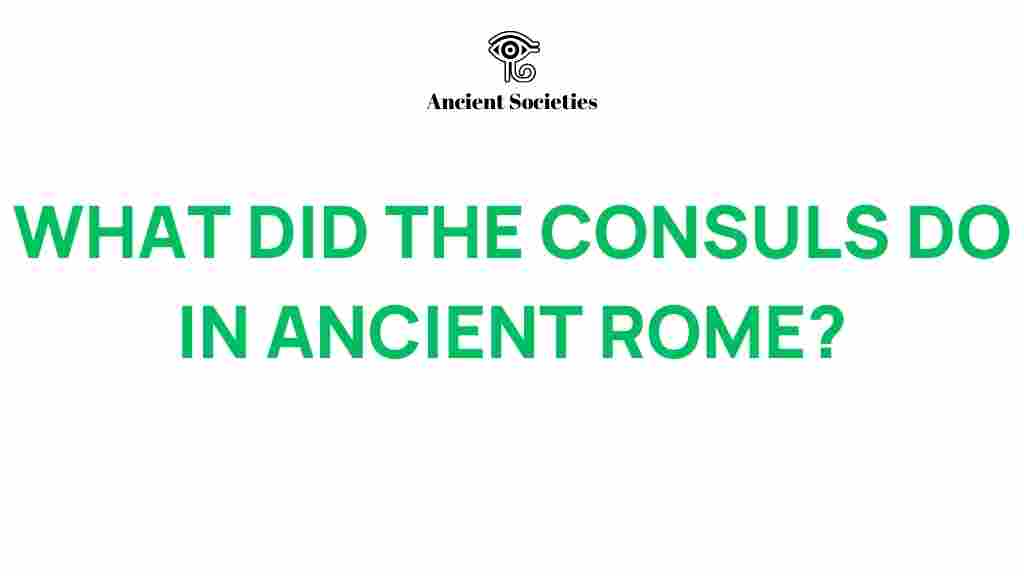Unveiling the Role of Consuls in Ancient Rome: Power and Prestige
The history of Ancient Rome is rich with tales of power, governance, and leadership, with the role of consuls standing out as one of the most significant. As the highest elected officials in the Roman Republic, consuls were entrusted with immense power and prestige, influencing the course of Roman history. In this article, we will explore the multifaceted role of consuls, their political authority, military command, and their lasting impact on governance in Ancient Rome.
Understanding the Role of Consuls
Consuls were central figures in the Roman Republic, serving as both political leaders and military commanders. They were elected annually and held the highest office in the Republic, a position that embodied authority and leadership. Here’s a closer look at their roles:
- Political Authority: Consuls were responsible for implementing laws, presiding over the Senate, and representing Rome in diplomatic matters.
- Military Command: They led armies into battle and were pivotal in expanding Roman territories during the Republic.
- Judicial Functions: Consuls had the power to summon the Senate and convene assemblies, influencing the legislative process.
- Religious Duties: In addition to their political and military roles, consuls performed vital religious ceremonies, reinforcing their authority among the populace.
The Election and Powers of Consuls
The election of consuls was a highly significant event in Ancient Rome. Here’s how the process generally worked:
- Nominations: Candidates for consul were typically drawn from the patrician class, although plebeians could also be elected as the Republic evolved.
- Election: The election was held in the Centuriate Assembly, where citizens voted for their preferred candidates.
- Term Length: Each consul served a term of one year, ensuring that power was not concentrated in a single individual for too long.
Upon election, consuls wielded considerable power, including:
- Veto Power: Each consul could veto the actions of the other, preventing unilateral decision-making.
- Imperium: This granted them the authority to command troops and enforce laws, both in Rome and in provinces.
- Proconsular Powers: After their term, consuls could be appointed to govern provinces, expanding their influence.
The Balance of Power in Governance
The system of governance in Ancient Rome was designed to prevent any single individual from amassing too much power. This was achieved through a series of checks and balances:
- Senate Oversight: The Senate, composed of Rome’s elite, played a crucial role in advising consuls and approving major decisions.
- Popular Assemblies: Citizens could vote on important matters, ensuring that the voice of the people was heard.
- Collegiality: The dual consulship meant that two consuls would share power, promoting collaboration and preventing tyranny.
The Military Command of Consuls
One of the most critical aspects of a consul’s role was military command. Consuls were often leaders in Roman military campaigns, and this role significantly shaped the Roman Republic’s expansion:
- Lead Armies: Consuls commanded troops and made strategic decisions on the battlefield.
- Prosecute Wars: They decided when and where to engage in conflict, impacting Rome’s territorial gains.
- Honor and Triumph: Successful consuls were awarded triumphs, public celebrations that recognized their military achievements.
Their military leadership was not without challenges, as the stakes were high, and failures in battle could lead to severe political repercussions.
Historical Impact of Consuls
The legacy of consuls in Ancient Rome is profound, influencing not only the Roman Republic but also the future of governance in Western civilization:
- Foundation of Republic Principles: The principles of shared power and checks and balances established by the consuls resonate in modern democratic systems.
- Military Leadership Models: The consuls’ approach to military command has influenced leadership in military organizations throughout history.
- Political Precedents: The conflicts and collaborations among consuls set precedents for political maneuvering and governance.
For further exploration of the political structures in Ancient Rome, you can read about the Senate’s role.
Troubleshooting the Misconceptions
Despite their importance, many misconceptions exist about the role of consuls in Ancient Rome. Here are some common misunderstandings and clarifications:
- Myth: Consuls held absolute power.
Fact: Their power was checked by the Senate and the assembly, preventing tyranny. - Myth: Consuls were solely military leaders.
Fact: They had significant political, religious, and administrative duties as well. - Myth: The consulship was a hereditary position.
Fact: Consuls were elected annually, ensuring political fluidity.
Conclusion
In conclusion, consuls in Ancient Rome were pivotal figures whose authority and leadership shaped the political landscape of the Roman Republic. They embodied the principles of governance, military command, and political power. Their legacy continues to influence modern political systems, reminding us of the significance of balanced authority and effective leadership. Understanding the role of consuls provides valuable insights into the complexities of Ancient Roman history and the foundations of contemporary governance.
For more information about Ancient Rome’s political history, visit this resource.
This article is in the category History and created by AncientSocieties Team
